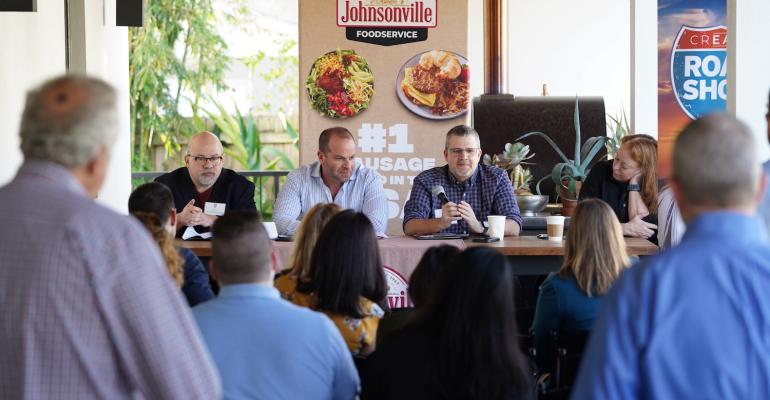Restaurant operators from in and around central Florida gathered in Orlando recently to share best practices and celebrate a return to a semblance of normalcy in the industry at the first CREATE Road Show event of 2023.
The series of events hosted by Nation’s Restaurant News seeks to foster community among operators as they all work to rebuild their businesses more efficiently.
This particular event was sponsored by Johnsonville Foodservice, which is also a founding sponsor of CREATE, and held at the Edible Education Experience in downtown Orlando. It was centered around open conversations about the ongoing issues of staffing, supply chain disruption, and improving the guest experience, as well as other pain points in the industry.
After a breakfast overseen by Johnsonville chef Cole Hanson that included French Toast & Sausage Napoleons — French toast stacked with sausage patties and topped with maple syrup and powdered sugar — and Bloody Mary Brunchwiches — English muffins topped with chorizo sausage strips, cream cheese spread, sharp cheddar cheese, a fried egg, peppers, onions and celery meant to evoke a Bloody Mary cocktail — a panel of operators shared their observations about the current state of affairs and also offered some solutions.
When it comes to labor Joshua Wallack, co-owner of Mango’s Tropical Cafe, with locations in Miami and Orlando, said he found the old-school European tradition of tacking on an automatic service charge had worked wonders for retention, especially in his markets where many international visitors don’t get the concept of tipping 20%.
He said with the automatic charge, both servers and their support staff, such as barbacks and bussers, and cooks got steadier pay, and more of it in most cases. He also said that getting regular weekly paychecks instead of cash at the end of the night meant his staff were more likely to still have money at the end of the month.
When asked about pushback from customers, Wallack said that it was essential to provide great service, but if his staff performed well the guests had no qualms about the service charge.
Tom Kempsey, senior director of operations for Margaritaville Global, and Amy Smith, vice president of culinary for Miller’s Ale House, both said their companies had seen success by tapping underutilized labor pools such as people who had been formerly incarcerated.
Smith said that, unlike other segments of the labor pool who often lacked motivation, ex-convicts were glad for the work.
Kempsey agreed, but cautioned that if you’re hiring employees who are still on work-release, they have curfews and might not be allowed to work late at night.
As off-premises orders skyrocketed during lockdown, and remain high afterwards, Smith said they had to rethink their packaging so the food would travel better. For example, burger toppings that were likely to wilt in transit, such as lettuce and tomatoes, were packed separately from the hot food.
She said Miller’s Ale House also had what she called “hybrid servers” who had higher hourly pay than regular servers but were responsible for packing orders to go while also handling a couple of tables.
Smith and Kempsey also said that supply-chain issues weren’t as bad as they were last year, and one of Kempsey’s priorities is now to return to the original pre-pandemic specs of each item rather than settling for substitutes.
Smith said that now if a certain ingredient isn’t available, she sets a specific timeframe for how long the substitute can be used to make sure the restaurants’ standards are as high as possible.
As social media becomes more and more of a traffic driver, all of the panelists advised attendees to embrace the need for visual appeal for their menu items.
They also suggested embracing online reviews and gleaning useful information from them. For example, if many reviewers say the chicken is dry. That’s probably a genuine problem that needs to be addressed.
The panel was followed by three rounds of “table talks” in which participants split into three groups to hash out the issues of labor, supply chain challenges, and the customer experience.
In brief, when it comes to labor, participants found that the current crop of employees want to work in a culture with good camaraderie where they feel like they’re part of a team and have the resources they need to develop their skills.
With regard to the supply chain, participants said that the worst seems to be over, but the challenges change all the time, from chicken one week to eggs, to packaging, to cornstarch. There are no easy solutions, but it’s something that people in charge of procurement have to stay on top of all the time.
As for customer experience, the consensus was that paying attention to details was important to guests, who were willing to pay more as long as the food, service and ambience meet their expectations.
That was followed by lunch that included barbecue pulled pork rolls with Johnsonville sausage strips on Kaiser rolls, smoked andouille sausage with shrimp & grits, and salad of greens sourced from the Edible Education Experience’s own garden.
The next CREATE Road Show will be held March 20 in Los Angeles at All Season Brewing.
More information is available here.

